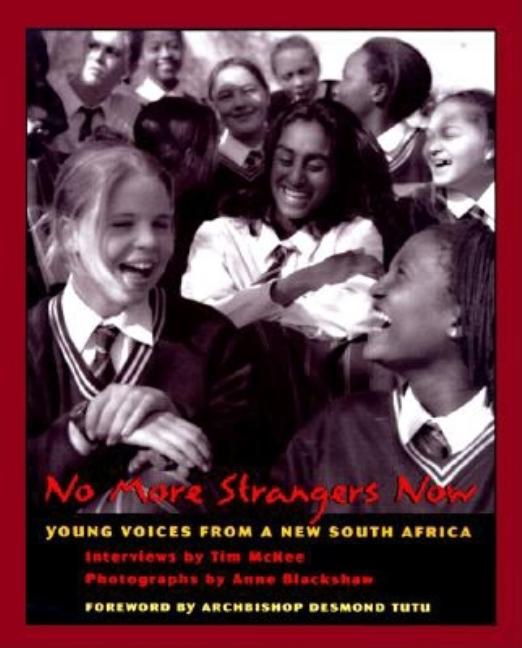Book Descriptions
for No More Strangers Now by Tim McKee
From Cooperative Children's Book Center (CCBC)
Tim McKee's interviews with 12 South African teenagers are presented here as lively first-person narratives, with each teen describing his or her life before and after the end of apartheid. Selected from 65 interviews the author conducted over a ten-month period in 1995-96, these 12 adolescent voices represent a range of personal histories and perspectives: Nithinia Martin, an 18-year-old Coloured woman, speaks candidly about race relations and her strong desire throughout childhood and adolescence to be like the white kids; 17-year-old Michael Njova was an abandoned child who survived by "stealing and stabbing" on the streets of Johannesburg until he was caught and sent to an orphanage at age 13; Vuyiswa Mbambisa, 16, grew up in exile with her mother in Angola and returned to Soweto as a young teenager to live with her grandmother, finding conditions much worse than she had expected; 16-year-old Mark Abrahamson had always taken his life of white privilege for granted until the breakdown of apartheid allowed him to see, close-up, how bad conditions were in the Black townships; and 15-year-old Pfano Takalani, living a traditional life in a remote rural area in Venda, comments that the biggest change in his life in the past few years occurred when his eldest brother was installed as chief in 1993. Eight of the 12 teens interviewed are Black and, with the exception of Pfano Takalani, each of them describes a childhood defined by poverty, brutality and oppression, and each one speaks with an amazing lack of bitterness. All 12 -- Black, white, Coloured and Indian -- have high hopes for a future where opportunity, freedom and equality will replace poverty, brutality and oppression. As 18-year-old Bandile Mashinini says: "We have a new constitution, and it's a great foundation, but it's still only ink on paper. I want to make sure we build well on top of it." This book gives us hope that he and his peers will be able to do just that. (Ages 12-18)
CCBC Choices 1998. © Cooperative Children's Book Center, Univ. of Wisconsin - Madison, 1998. Used with permission.
From The Jane Addams Children's Book Award
Just four years after South Africa abolished apartheid as a national, legal practice, thirteen South African teens tell stories about living under apartheid and about learning to take part in the New South Africa. Expressing guilt, anger, jealousy, love, and, most importantly, hope, these white, Coloured and African teens are ready for change, acceptance and equality. Eager to be a part of this change through the way they treat one another, they face their futures with openness to new ideas and a thirst for education.
The Jane Addams Children's Book Award: Honoring Peace and Social Justice in Children's Books Since 1953. © Scarecrow Press, 2013. Used with permission.


